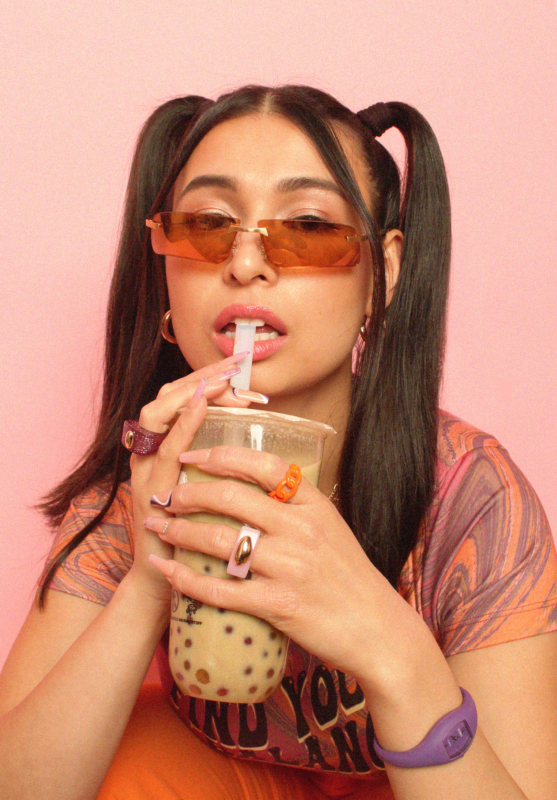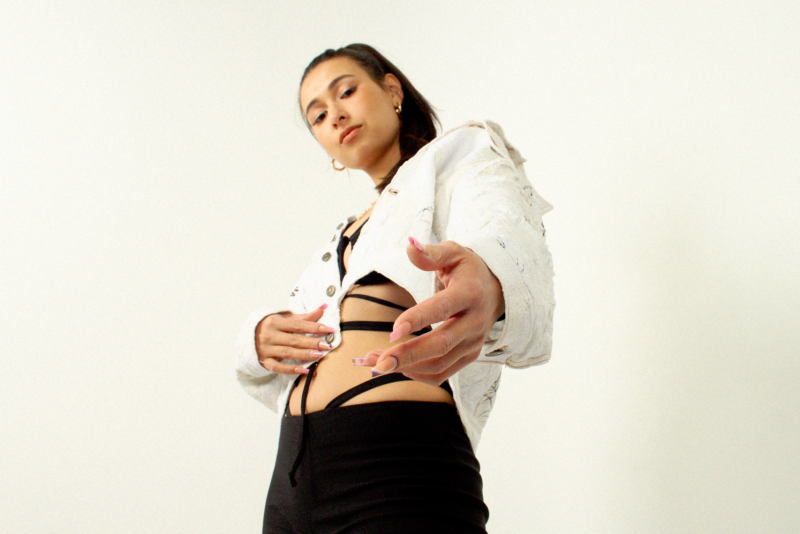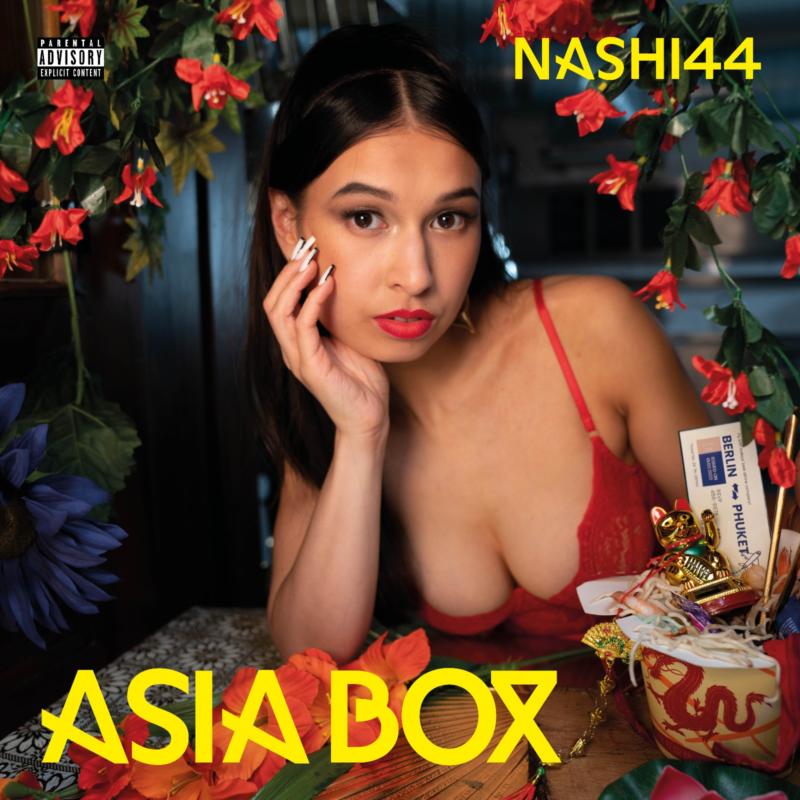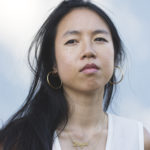Growing up in Berlin, the Chinese-Vietnamese-German artist Nashi44 embarked on studying vocal, jazz and pop. However, it was not her forte and she decided to quit her traditional studies to pursue her love for rap and r & b by herself. We meet on a warm July day in the summer of 2021 as we discuss Nashi’s work.
Huyen: Nashi, let’s start off: how did you enter the rap and hip hop scene?
Nashi: I grew up listening to hip hop music, and r & b, mainly American hip hop music, but also Berlin rap music, some of it because of my older brothers. It was always the kind of music that felt close to me. It was the music of people of color and that’s where I felt represented. Then for the past two years when I was in Leipzig, I experienced more than the everyday racism. Hip-hop music and rap music became the perfect medium to express my feelings and up until that point, I was always singing about love. I was ten when I started to write little poems in German, however, I never felt the urge to make it into music. Once I started studying music 24/7 in Leipzig, rap music and the experiences I have made, they all came together.
Huyen: And did you have any favorite rappers or r & b artists you looked up to, if so who were they?
Nashi: I listened to Tupac. For me he was the first rapper where I literally wanted to learn English from. He’s a political rapper, but in the sense that everyone listened to his music and it wasn’t academic English. Besides, I also listened to a lot of mainstream music like Beyoncé or Destiny’s Child. I remember I had the album of Usher’s Confessions and I listened to it on my Walkman back then, and I was dancing, carrying my Walkman in one hand and just singing along. Although I couldn’t speak English at that time – I was maybe six years old – I knew every single lyric.
Huyen: Yes, I also loved Beyoncé and Destiny’s Child growing up. I only got to know Tupac later, so how did you start your project Nashi44?
Nashi: Maybe project isn’t the right word for it because I always wanted to write my own songs and perform, and when I was in Leipzig I had the time to fully embrace music and just focus on doing music. I wanted to have a nice name that didn’t have a deeper meaning because I knew I wanted to speak about more political issues in my music. So, it’s just my favorite fruit, the Nashi fruit and 44 is because I’m from Neukölln and that’s the old zip code of the area in Berlin.
Huyen: So, how long have you been performing as Nashi44?
Nashi: For two years now. Well, it was at the same time as the first national lockdown happened, so it was kind of strange, but whenever I got the opportunity to be on stage in front of a public audience I really enjoyed it. It’s always a surprising moment when they hear you for the first time because people will ask me where I’m from and my song “Aus der Pussy” (engl. From the pussy) is my answer to that. They’re always astonished and then they laugh and then they just sing the song along until the end and really feel it.

Huyen: Yeah, I fully understand. When I first heard your song “From the pussy”, it was really empowering and so fun that you stood up and talked back. What was your inspiration for your first single and how was your writing process?
Nashi: Since I was new in Leipzig, I got that question a lot: “Where are you from?” At that time, it happened to me so many times that I felt exhausted and I wanted to have an answer to this. I wanted to turn this negative experience into something empowering. I started talking to a lot of my friends and the BIPOC community and finally got to the answer: I’m from my mother, you know. It all comes down to that and so I tried to write down my experiences into the verses. Those words really happened to me. Like I’m entering a club, people asking me where you’re from. It took some time, but then I finished my first song:
“Aus der Pussy”
“Wie oft war ich schon mit meinen girls unterwegs,
Standardfrage bei denen: Ey was geht?,
doch bei mir wurde schnell mal um phrasiert:
Hola Chica, Konichiwa, parlez vous francais?
Kann ich keinen Club betreten, ohne ‘ne Quizshow los zu treten?
Kategorie: Nashi’s Leben, Städte bis zum getno runter beten,
fässt mich an, ausverseh’n, soll ihm meine Nummer geben,
kommt nicht klar, wenn ich geh, ich lass ihn dumm da stehen,
Muss ich mir erst meine Haut bleichen?
will ich nur den Fragen ausweichen,
fragt dieser Alman einen weißen,
ist ein Ort zu nennen ausreichend.
Weil ich nicht politisch weiß bin,
reduziert werd’ auf mein Äuß’res,
Aussehen, das nicht der Norm entspricht,
merkst dein eingeschränktes Weltbild, ja.
Ohne Scham, fragt der Alman,
wo ich herkam, ja ich komme
Aus der Pussy, aus der Coochie,
aus der Con Chim, meiner Mutti!”
English translation:
“Out of Pussy”
“How many times have I been out with my girls,
Standard question with them: Ey what’s up?,
but with me it was quickly changed:
Hola Chica, Konichiwa, parlez vous francais?
Can’t I just enter a club without starting a quiz show?
Category: Nashi’s life, praying cities down to the getno,
touches me, by mistake, supposed to give him my number,
can’t handle me leaving, when I leave, I leave him standing there stupid,
Do I have to bleach my skin first?
I just want to avoid the questions,
if this Alman* asks a white one,
to name a place is enough.
Because I’m not politically white,
I’m reduced to my appearance..,
appearance, which does not correspond to the norm,
do you realise your limited world view, yes.
Without shame, asks the Alman,
where I came from, yes I come
From the pussy, from the coochie,
from the Con Chim, of my mommy!”
*Alman is Turkish for German person. In recent years, the term has been used to refer to stereotypical white Germans, see Karen reference in the U.S.

Huyen: Congratulations on your second single and your music video “Butterfly”! What was the inspiration for that one?
Nashi: The inspiration for that was my work in castings for operas in Germany, in Berlin. That’s where I got to know Madame Butterfly, the opera. I felt shocked, how is it possible that people are still playing this opera and white people are using yellow facing. I wanted to give Madame Butterfly a new meaning because the story was very upsetting for me. The main issue is that Eastern or Southeastern Asian women are fetishised. And let me say this, it’s always the white man who conquers the East Asian woman. I wanted to flip it. I also came across the film Full Metal Jacket and after watching that one scene, it was as if Asian women are only there for sexual pleasure and nothing else. And I wanted to flip that as well. So, I wrote the song Butterfly and switched it to: “Me so angry, me hate you long time.”
I wanted to create a new strong, independent picture of an Eastern or South Eastern Asian woman. I can defend myself with my Butterfly and can use my words and my attitude. What’s also special about the video is that we filmed it in Vietnamese places in Berlin. Inside Dong Xuan Center and at a hairdresser. This was also special for me because in a lot of music videos you see people using East Asian cultural backgrounds, but with no deeper meaning and no connection. I wanted to criticize this as well and reclaim those locations and spaces back.
Huyen: Earlier you told me that you also have been on stage in front of an Asian audience and that you enjoyed the experience, it was so different, you said. Would you mind sharing?
Nashi: So I started doing music when I was 12 years old. I was always used to performing in front of a white audience, singing mainly English pop songs, but then I was invited to this event series called Voicemail* in Berlin and it was the first time that I performed in front of a mainly non-white audience. It felt like home, it’s weird because seeing myself reflected in the audience just gives me a different level of confidence. I can express myself freely without doubting myself, I don’t have to pretend I speak perfect German so that they don’t think I don’t belong here. It is just a different level of being free on stage.
I also had a similar experience being on stage at the Atlanta protest in front of the Brandenburger Tor. It was next level for me because being on stage at the protest was really powerful. It was such an important issue.
*An event series highlighting queer Asian performers.
~

Fast forward it is 2022, and I followed up with the rapper, who released her first EP titled “Asia Box” earlier this year. It includes some new tracks such as “Suck On My Spring Roll” or “Virus In Der DNA” (Engl. Virus in the DNA).
Huyen: Nashi! You just launched your EP, how are you feeling and how has the feedback been?
Nashi: I am very happy and excited that my first EP is out now. I received so many lovely messages, like “I feel so empowered, listening to your music” and that makes me happy.
Huyen: On “Suck On My Spring Roll” and “Virus in the DNA”, you rap about your first ex-boyfriend who had an Asian Fetish, you mention the racist murders from Dessau to Atlanta, how we need to protect our sisters, and you reflect on your time throughout the pandemic, how important was it for you to speak up here?
Nashi: I rap because I want to talk about difficult issues straight on. I think we can change situations if we speak about it. So it was very important for me to release these two songs.
Huyen: Super excited to see and hear what’s next for you, is there anything you’d like to share yet?
Nashi: I will be working on new songs during my artist-in-residency stay in Brazil and hopefully release new songs next year.
Find Nashi44 on Spotify, Instagram and on her website.
 Born in Germany, Thị Minh Huyền Nguyễn is a Vietnamese artist-scholar and athlete. She started Gold to Green, an online publication and podcast at the intersections of health, running, sustainability and culture in 2011. Having studied and worked in New York City, Huyen has co-founded WocForward in Brooklyn (a monthly exercise club for and by women of color) and Wayv Run Kollektiv back in Berlin to elevate queer, Black and brown, underrepresented runners. When Huyen is not writing or running, she’s involved in anti-racism / empowerment projects such as ichbinkeinvirus.org and biwoc-rising.org.
Born in Germany, Thị Minh Huyền Nguyễn is a Vietnamese artist-scholar and athlete. She started Gold to Green, an online publication and podcast at the intersections of health, running, sustainability and culture in 2011. Having studied and worked in New York City, Huyen has co-founded WocForward in Brooklyn (a monthly exercise club for and by women of color) and Wayv Run Kollektiv back in Berlin to elevate queer, Black and brown, underrepresented runners. When Huyen is not writing or running, she’s involved in anti-racism / empowerment projects such as ichbinkeinvirus.org and biwoc-rising.org.
Nashi44 is a Viet-German rapper from Berlin-Neukölln, who released her first single in 2021. With rap videos on Instagram, she has already made a name for herself and has proven that she has attitude as well as a lot of skills. The fierce rapper is self-confident and has delivered a very strong debut with “Aus der Pussy.” Whether empowering tracks with political announcements or humorous punchlines and melodic R’n’B vibes – Nashi44 has big plans and has even given up her jazz and pop singing studies for it. She wants to give strength and courage with her songs but she also wants to be an entertaining club banger. Her first EP was released in Spring of 2022.


